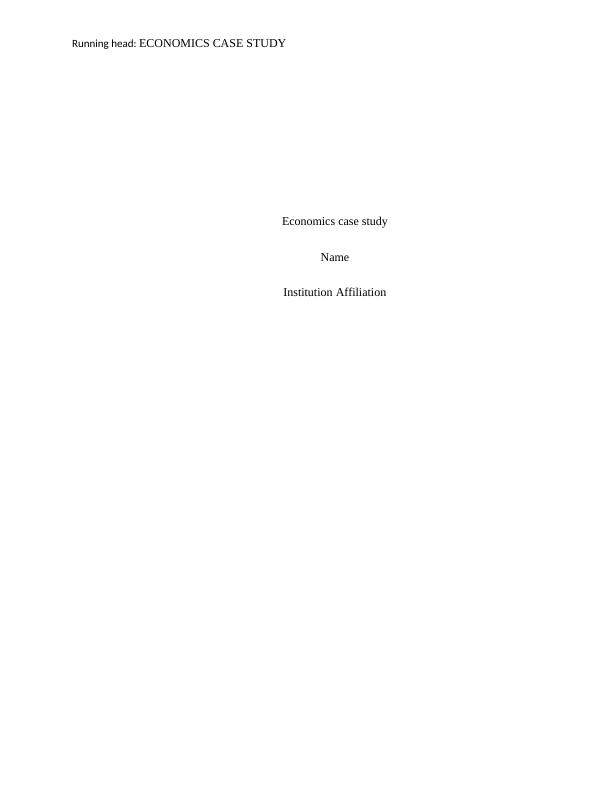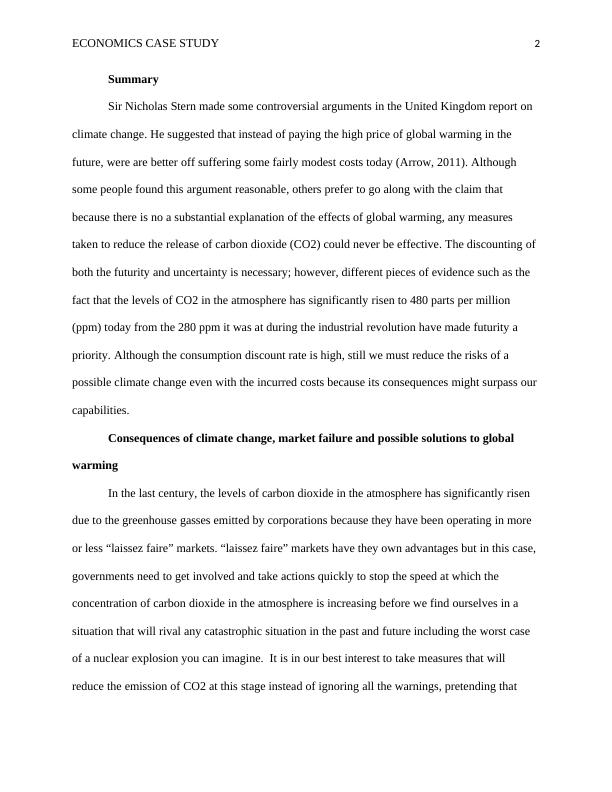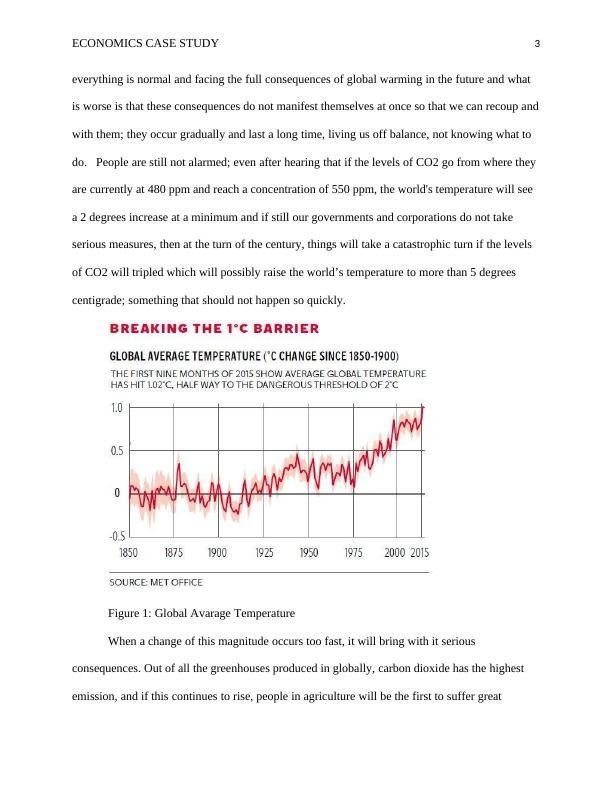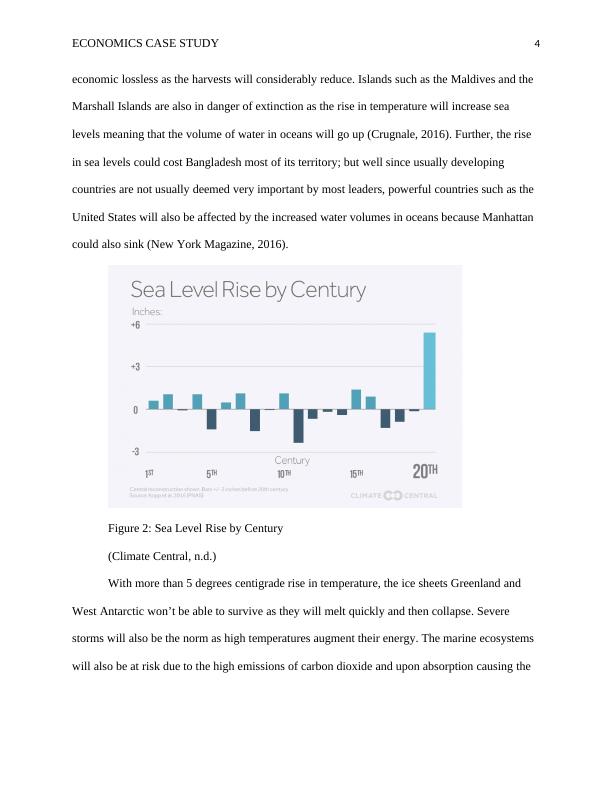Economics Case Study on Climate Change
Added on 2020-02-24
15 Pages3410 Words127 Views
Running head: ECONOMICS CASE STUDYEconomics case studyNameInstitution Affiliation

ECONOMICS CASE STUDY2Summary Sir Nicholas Stern made some controversial arguments in the United Kingdom report on climate change. He suggested that instead of paying the high price of global warming in the future, were are better off suffering some fairly modest costs today (Arrow, 2011). Although some people found this argument reasonable, others prefer to go along with the claim that because there is no a substantial explanation of the effects of global warming, any measures taken to reduce the release of carbon dioxide (CO2) could never be effective. The discounting of both the futurity and uncertainty is necessary; however, different pieces of evidence such as the fact that the levels of CO2 in the atmosphere has significantly risen to 480 parts per million (ppm) today from the 280 ppm it was at during the industrial revolution have made futurity a priority. Although the consumption discount rate is high, still we must reduce the risks of a possible climate change even with the incurred costs because its consequences might surpass our capabilities. Consequences of climate change, market failure and possible solutions to global warmingIn the last century, the levels of carbon dioxide in the atmosphere has significantly risen due to the greenhouse gasses emitted by corporations because they have been operating in more or less “laissez faire” markets. “laissez faire” markets have they own advantages but in this case, governments need to get involved and take actions quickly to stop the speed at which the concentration of carbon dioxide in the atmosphere is increasing before we find ourselves in a situation that will rival any catastrophic situation in the past and future including the worst case of a nuclear explosion you can imagine. It is in our best interest to take measures that will reduce the emission of CO2 at this stage instead of ignoring all the warnings, pretending that

ECONOMICS CASE STUDY3everything is normal and facing the full consequences of global warming in the future and what is worse is that these consequences do not manifest themselves at once so that we can recoup andwith them; they occur gradually and last a long time, living us off balance, not knowing what to do. People are still not alarmed; even after hearing that if the levels of CO2 go from where they are currently at 480 ppm and reach a concentration of 550 ppm, the world's temperature will see a 2 degrees increase at a minimum and if still our governments and corporations do not take serious measures, then at the turn of the century, things will take a catastrophic turn if the levels of CO2 will tripled which will possibly raise the world’s temperature to more than 5 degrees centigrade; something that should not happen so quickly. Figure 1: Global Avarage Temperature When a change of this magnitude occurs too fast, it will bring with it serious consequences. Out of all the greenhouses produced in globally, carbon dioxide has the highest emission, and if this continues to rise, people in agriculture will be the first to suffer great

ECONOMICS CASE STUDY4economic lossless as the harvests will considerably reduce. Islands such as the Maldives and the Marshall Islands are also in danger of extinction as the rise in temperature will increase sea levels meaning that the volume of water in oceans will go up (Crugnale, 2016). Further, the rise in sea levels could cost Bangladesh most of its territory; but well since usually developing countries are not usually deemed very important by most leaders, powerful countries such as the United States will also be affected by the increased water volumes in oceans because Manhattan could also sink (New York Magazine, 2016). Figure 2: Sea Level Rise by Century (Climate Central, n.d.)With more than 5 degrees centigrade rise in temperature, the ice sheets Greenland and West Antarctic won’t be able to survive as they will melt quickly and then collapse. Severe storms will also be the norm as high temperatures augment their energy. The marine ecosystems will also be at risk due to the high emissions of carbon dioxide and upon absorption causing the

End of preview
Want to access all the pages? Upload your documents or become a member.
Related Documents
MBA712 - Economics for Managers - Assignmentlg...
|18
|3901
|67
Is Climate Change a Result of Human Activities?lg...
|7
|1558
|65
Atmospheric carbon dioxide has increasedlg...
|16
|4231
|18
Economic Case Study - Environmental Change In The United Kingdomlg...
|12
|3114
|64
SREM01-8 Abstract The Effects of the Emission of Greenhouse Gas on the Earth's Atmospherelg...
|11
|2867
|441
MPE 781, Global Warming and Market Failurelg...
|18
|4112
|94